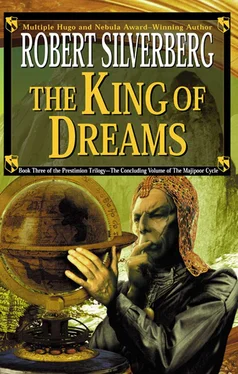“Well, then,” Gaviral said finally. His quick little eyes flickered from side to side in that characteristic manner of his that was so like a small rodent’s. He brandished some papers that he held crumpled in one hand. “You’ve heard the news from the Labyrinth, Mandralisca?”
“That the Pontifex is seriously ill following a stroke, milord?”
“That the Pontifex is dead,” Gaviral said. “The first stroke was not fatal, but there was a second one. He died instantly, so say these reports, which have been some time in reaching us. Prestimion has already been installed as his successor.”
“And Dekkeret as the new Coronal?”
“His coronation will soon take place,” said Gavdat, intoning the words as though he were transmitting messages from some invisible spirit. “I have cast his auspices. He will have a short and unhappy reign.”
Mandralisca waited. These remarks did not seem to call for comment.
“Perhaps,” said the Lord Gaviral, running his fingers through his thinning reddish hair, “this would be an auspicious moment for us to proclaim the independence of Zimroel under our rule. The formidable Confalume gone from the scene, Prestimion preoccupied with establishing his administration at the Labyrinth, an untried new man taking command at the Castle—what do you say, Mandralisca? We pack up and return to Ni-moya, and let it be known that the western continent has lived long enough under the thumb of Alhanroel, eh? We present them with an accomplished fact, poof! and defy them to object.”
Before Mandralisca could reply there came a loud clattering and crashing in the outside hall, and some hoarse shouts. Mandralisca assumed that these noises were harbingers of the arrival of the blustering bestial Lord Gavinius, but to his mild surprise the newcomer was bulky thickset Gavahaud, he who fancied himself a paragon of elegance and grace. The interruption was a welcome one: it gave him a moment to find the most diplomatic way of framing his response. Gavahaud came in muttering about encountering an unexpected obstacle in the sculpture-hall outside. Then, seeing Mandralisca, he glanced toward Gaviral and said, “Well? Does he agree?”
No question that they were seething with the yearning to unleash their war against Prestimion and Dekkeret. They wanted only for him to pat them on their heads and praise them for their high ambitions and warlike souls.
All three brothers had their attention focused intently on him now: gimlet-eyed Gaviral, bloodshot Gavahaud, moist-eyed foolish Gavdat. It was almost poignant, Mandralisca thought, how dependent they were on him, how terribly eager they were to have him confirm whatever pitiful shreds of strategy they had contrived to work out for themselves.
He said, “If you mean, milord, do I agree that this is the proper time to announce ourselves independent of the imperial government, my answer is that I do not believe it is.”
Each of the three reacted in his own way to Mandralisca’s calm declaration. Mandralisca observed all three reactions in a single glance, and found them instructive.
Gavdat seemed to recoil almost in shock, his head snapping back so sharply that his soft cheeks jiggled like puddings. Very likely he had made use of his instruments of prognostication to arrive at a very different expectation. Haughty Gavahaud, obviously also startled and disappointed, glared at Mandralisca in astonishment, as though Mandralisca had spat in his face. Only Gaviral took Mandralisca’s reply calmly, looking first to one brother and then the other in a smug self-congratulatory way that could mean only one thing: There! Did I not tell you so? It’s important to wait and check things out with Mandralisca. It was the mark of Gaviral’s intellectual preeminence, in this mob of loutish thick-brained brothers, that he alone had some glimmering of self-awareness, some knowledge, perhaps, of how stupid they all really were, how badly they needed their privy counsellor’s guidance in any matter of significance.
“May I ask,” Gaviral said carefully, “just why you feel as you do?”
“Several reasons, milord.” He enumerated them on his fingers. “The first: this is a time of general mourning throughout Majipoor, if I recall correctly the reaction to the Pontifex Prankipin’s death twenty years ago. Even in Zimroel the Pontifex is a revered and cherished figure, and in this case the Pontifex was Confalume, the most highly regarded monarch in centuries. I believe it would seem tasteless and offensive to undertake a revolutionary break with the imperial goverment in the very hour when people everywhere are expressing, as I have no doubt they are, their grief at the death of Confalume. It would forfeit us a great deal of sympathy among our own citizens, and would stir an unprofitable degree of anger among the people of Alhanroel.”
“Perhaps so,” Gaviral conceded. “Go on.”
“Second: a proclamation of independence needs to be accompanied by a demonstration that we are capable of making good on our words. I mean by that that we are only in the most preliminary stages of organizing our army, if indeed we have come as far even as the preliminary stages. Therefore—”
“You foresee a war with Alhanroel, do you?” the Lord Gavahaud asked, in a lofty tone. “Is it possible that they would dare to attack us?”
“Oh, yes, milord. I very much think they would attack us. The much-beloved Prestimion is in fact a man of strong passions and no little fury when he is crossed: I have ample evidence of that out of the experience of your famous uncle Dantirya Sambail. And Lord Dekkeret, from what I know of him, will not want to begin his reign by having half his kingdom secede. You can be quite certain that the imperials will send a military force our way as soon as they’ve digested our proclamation and can levy a body of troops.”
Gavdat said, “But the distances are so great—they’d have to sail for many weeks just to reach Piliplok—and then, to march across hostile territory all the way to Ni-moya—”
It was a reasonable point. Perhaps Gavdat was not quite so much of a fool as he seemed, Mandralisca thought.
“You’re right, milord, that operating a line of supply that stretches all the way across the Inner Sea from Castle Mount to Ni-moya will be a very challenging task. That is why I think we’ll ultimately be successful in our revolt. But they will have no choice, I think, but to try to regain their grasp of us. We must be fully prepared. We must have troops waiting at Piliplok and all the other major ports of our eastern coast, possibly as far south as Gihorna.”
“But there’s no harbor good enough for a major landing in Gihorna!” Gavahaud objected.
“Exactly so. That’s why they might attempt it: to take us by surprise. There’s no big harbor there, but there are minor ones all up and down the province. They might make several landings at once in places so obscure they don’t expect us to think of them. We must fortify the whole coast. We must have a second line of defense inland, and a third at Ni-moya itself. And we’ll need to assemble a fleet to meet them at sea in the hope of preventing them from reaching our shores in the first place. All this will take time. We should be well along in the task before we tip our hand.”
“You should know,” Gavdat said, “that I have cast the runes very carefully, and they predict success in all our endeavors.”
“We expect no other outcome,” said Mandralisca serenely. “But the runes alone won’t ensure our victory. Proper planning is needed also.”
“Yes,” said Gaviral. “Yes. You see that, brothers, do you not?”
The other two looked at him uncomfortably. Perhaps they sensed in some dim way that quick little Gaviral was somehow outflanking them, allying himself suddenly with the voice of caution now that he realized that caution might be required.
Читать дальше












